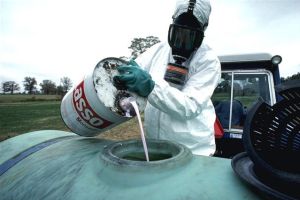The first thing you should know about pesticides is that they are all-pervasive. The manufacturing and marketing of pesticides is a global industry that generates over $45 billion per year in revenue. More than one billion pounds of them are sprayed annually onto edible crops in the United States alone. And because worldwide demand for food is escalating, so is the use of pesticides, at a rate of almost 3% per year.
The second thing to know – and the more important – is that pesticides are poisons. Most chemical pesticides are neurotoxins, which means that they are designed to destroy the nervous system of the insects they are used to kill. Unfortunately, if these neurotoxins creep into our food supply, or if we are exposed while using them in our home and garden, they can destroy our nervous system as well. The Environment Protection Agency estimates that we are exposed to pesticides, herbicides, and fungicides over 400 times a day in the average American household.
That’s pretty shocking. What can I do to protect myself and my family against pesticides?
First, try to become more aware of the foods you and your family eat. If you can, choose organic produce, grown without the use of chemical fertilizers or pesticides. Buy from local farms whose “organic pedigree” you have researched. Common foods that have been proven to contain more than recommended levels of pesticides include apples, spinach, strawberries, and peaches, so these are particularly good candidates for “buying organic.”
If you cannot accurately determine the source of the produce you buy, wash it carefully before you prepare it to remove any residual chemicals. And learn to trust your senses when dining out – food that has been exposed to pesticides often has a bitter taste that can leave your lips feeling numb. In your home, try to limit the use of any chemical pesticides. One way you can do this is by keeping the areas in which you store food clean – more clean than you normally do – so that insects and other pests are not tempted to invade your home.
If you use pesticides, learn to handle them safely
In your garden, and especially if you grow some of your own produce, try to use non-chemical pesticides that are not dangerous to the environment or to humans. If you cannot, follow these critical guidelines prepared by governmental agencies and health officials when using pesticides:
- Read the labels. They will contain warnings about how to safely use the pesticide you are using. In particular, if the label says that you should wear a protective mask or respirator, wear one.
- Wear protective clothing. This means that you should not spray weed killer or pesticides in your garden while wearing shorts and sandals. Wear long-sleeved shirts with gloves, wear long pants, and always wear shoes and socks.
- After handling pesticides, wash. Always wash your hands thoroughly before eating or drinking, and even before doing anything that can transfer the pesticides to your skin or mouth, such as smoking a cigarette or even wiping your brow. When you are done, shower thoroughly, washing your hair, and all parts of your body.
- Isolate and wash any clothing you were wearing. If you’re not going to wash it immediately, put all clothing you were wearing in a plastic bag and keep it separate from other clothing. Leave your shoes outside so that you don’t track harmful chemicals into the house, and wash them outside. Wear gloves when you wash the contaminated clothing to avoid skin contact with the chemicals. Using a heavy-duty liquid detergent with the hottest water available, choose the longest wash cycle. If the clothing is heavily soiled, wash it more than once, and then line-dry it outside—don’t put it in your dryer. After washing the contaminated clothing, run the washing machine through a complete cycle with hot water and detergent before washing any other clothes.
These guidelines may seem extreme, but they are important. We offer them out of an abundance of caution because even our best science cannot tell us all of the health effects that may result from prolonged exposure to these types of chemicals. Even small amounts of pesticides can affect your immune system and thus your overall health if you are exposed to them. So be proactive about your health – and your family’s health – by minimizing your exposure to these harmful chemicals as much as you can.

